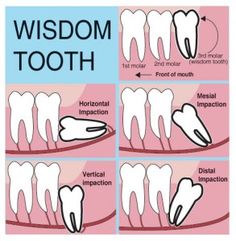Tooth loss is not a total loss. Sometimes, it’s a course a normal adult undergoes. Just like having a wisdom tooth removed between the ages of 17 to 25.
Wisdom tooth extraction is done for one purpose. And that is to create a room in the mouth and make the rest of the teeth fit comfortably. There are two known ways in removing wisdom tooth. First is to acquire professional wisdom teeth removal. Second is to consider the theory of wait and see approach. This is a particular method where you wait until the painful wisdom teeth signs and symptoms come in.
Despite the need to remove your wisdom tooth, it’s wise to learn things about them initially. What are its use and how to identify if they are impacted or not? And why dentists believed removing them is natural and normal?
Wisdom teeth are the third molars. They are found at the upper and lower areas of your mouth specifically at the very back part of it. Most cases, they are last teeth to erupt. The primary purpose of these teeth is to help you chew and break foods properly. Although wisdom teeth are used for a good cause, majority of dentists recommended an extraction especially when they are impacted and giving so much pain.
Symptoms, Causes and Effects of Impacted Wisdom Teeth
Few people only have healthy wisdom teeth. This refers to wisdom teeth that fit perfectly to your mouth. However, for those who are unfortunate enough to get one, wisdom teeth could be a liability – instead of being an asset. This is where infections start to transpire.
Impacted wisdom teeth happen if the jaw isn’t large enough to accommodate them. They can be identified if they grow sideways. Or remain trapped beneath your jawbones and gums. Any of these symptoms can cause sharp and pressure pain. Additionally, impacted wisdom teeth cause gum infection. This is due to the bacteria trapped in the wisdom teeth’s gum. Aside from gum infection, this causes pain, jaw stiffness and swelling.
Impacted wisdom teeth most likely lead to tooth decay especially if the wisdom tooth doesn’t completely emerged. Partially erupted wisdom teeth make it difficult for you to do your dental duties, such as brushing and flossing your teeth daily. And if your teeth aren’t provided enough care, bacteria and food debris start to penetrate. If left ignored, this causes cavities and periodontal diseases. Moreover, impacted wisdom teeth cause a fluid-filled sac, known as cysts. This may develop around your gums particularly to where your impacted wisdom tooth is. Once overlooked, the cysts can cause jaw fractures.
Wisdom Teeth Extraction
You can always keep your wisdom teeth as long as they are causing no pain. However, if they are, they should be dealt with a professional dentist, in an emergency dental hospital, for an extraction. As stated earlier, you can remove your wisdom tooth in two ways – and that is to get an early extraction or wait for the wisdom teeth to erupt itself. Usually, it’s best to get an early extraction. When a wisdom tooth grows, their roots also grow. Long roots make it hard for dentists to remove the wisdom tooth as well as the complications that come along with it. The earlier you remove your wisdom tooth, the lesser complications you face.
Wisdom teeth extraction is usually done by an oral surgeon. These well-trained dentists use local anesthesia to numb the tooth from pain. For extreme cases, oral surgeons will conduct additional treatments to support the surgical procedure, such as using the methods of sedation dentistry.
Whether you choose an early extraction or not, there are inevitable risks you will experience. The first common adverse effect is paresthesia. Paresthesia makes your tongue and lips numb. This is an indication of damaged nerves caused by dental surgery. Although the numbness felt is temporary, there are rare cases where the damaged nerves acquired become permanent. Another effect of wisdom teeth extraction is dry socket. This comes with a sharp pain that needs immediate attention. Dry socket often happens if the clot dislodged or doesn’t form around the wound.
When it comes to wisdom teeth, there are plenty of things you must consider. And the best way to learn it all is to be with a professional dentist. Find one and get one.
